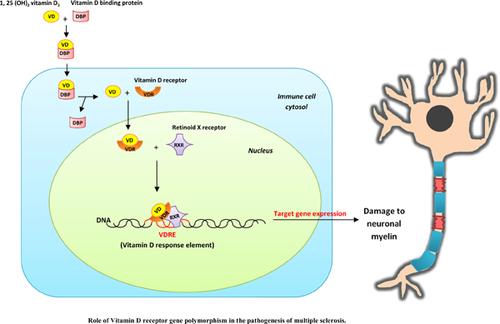Endocrine, Metabolic & Immune Disorders - Drug Targets ( IF 2.0 ) Pub Date : 2021-06-30 , DOI: 10.2174/1871530320666200910113954 Mahya Pourostadi 1 , Simin Sattarpour 2 , Behroz Mahdavi Poor 3 , Mohammad Asgharzadeh 1 , Hossein Samadi Kafil 4 , Mehdi Farhoudi 5 , Vahid Asgharzadeh 6 , Ali Vegari 7 , Nima Najafi-Ghalelou 3 , Jalil Rashedi 3

|
Background: Multiple sclerosis (MS), a disease of the central nervous system (CNS), is associated with damage to the myelin sheath of neurons. It is demonstrated that vitamin D deficiency plays an important role in the development of the disease. Binding of vitamin D to its specific nuclear receptors is a way to exert its function.
Objective: Possible correlation between the vitamin D receptor (VDR) gene and MS was evaluated in the Azeri population of Iran.
Methods: Different genotypes of the Bsml site were determined by using the PCR-RFLP method in 148 MS patients and 220 non-relative healthy controls.
Results: In MS patients, genotype bb was significantly higher than the healthy controls (p<0.05). Additionally, most subjects of the MS group had been insufficiently exposed to sunlight before the age of 15 (p<0.001). Our findings indicated that the red meat intake in MS patients was significantly higher than the healthy controls (p<0.001). In addition, the healthy controls had appropriate dieting behaviors in comparison to MS patients (excessive intake of some foods) (p=0.0001).
Conclusion: In conclusion, genotype BB and sufficient exposure to sunlight before the age of 15 were the protective factors against MS. Although, excessive consumption of red meat and inappropriate dieting behaviors were predisposing factors to MS disease.
中文翻译:

伊朗阿塞拜疆人维生素 D 受体基因多态性和多发性硬化症风险
背景:多发性硬化症 (MS) 是一种中枢神经系统 (CNS) 疾病,与神经元髓鞘的损伤有关。研究表明,维生素 D 缺乏在疾病的发展中起着重要作用。维生素 D 与其特定核受体的结合是发挥其功能的一种方式。
目的:评估了伊朗阿塞拜疆人群中维生素 D 受体 (VDR) 基因与 MS 之间可能的相关性。
方法:采用PCR-RFLP方法对148例MS患者和220例非亲属健康对照者Bsml位点的不同基因型进行检测。
结果:在MS患者中,基因型bb显着高于健康对照(p<0.05)。此外,MS 组的大多数受试者在 15 岁之前没有充分暴露在阳光下(p<0.001)。我们的研究结果表明,MS 患者的红肉摄入量显着高于健康对照组(p<0.001)。此外,与 MS 患者相比,健康对照组具有适当的节食行为(过量摄入某些食物)(p=0.0001)。
结论:综上所述,基因型BB和15岁前充足的阳光照射是MS的保护因素。尽管如此,过度食用红肉和不适当的节食行为是 MS 疾病的诱发因素。











































 京公网安备 11010802027423号
京公网安备 11010802027423号